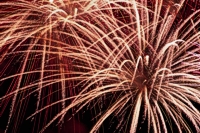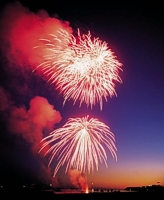Fireworks
 Fireworks are widely used at public and private celebrations and traditional events. While they can add excitement, they can also frighten and disturb people and animals, cause annoyance, damage and impact on air quality.
Fireworks are widely used at public and private celebrations and traditional events. While they can add excitement, they can also frighten and disturb people and animals, cause annoyance, damage and impact on air quality.
Noise
Fireworks can frighten people and animals, particularly children and the elderly. Farm animals have been scared to death and startled animals have been injured, killed and caused accidents when bolting. Disturbing domestic pets can also be dangerous as panicked pets can be aggressive vicious and destructive.
Air pollution
 Fireworks emit light, heat and sound energy along with carbon dioxide and other gases and residues. Exact emissions will depend on the firework but as gunpowder is a main component, sulphur compounds are emitted, along with small amounts of particulates, metal oxides and organic compounds (including minute amounts of poly cyclic aromatic hydrocarbons, dioxins and furans). On and around Bonfire Night (5 November) there is often a noticeable increase in pollution. Approximately 14% of UK dioxin emissions are produced around this date - most from bonfires as well as fireworks. Research suggests that deposits of pollutants from fireworks do not pose a risk to soil or water.
Fireworks emit light, heat and sound energy along with carbon dioxide and other gases and residues. Exact emissions will depend on the firework but as gunpowder is a main component, sulphur compounds are emitted, along with small amounts of particulates, metal oxides and organic compounds (including minute amounts of poly cyclic aromatic hydrocarbons, dioxins and furans). On and around Bonfire Night (5 November) there is often a noticeable increase in pollution. Approximately 14% of UK dioxin emissions are produced around this date - most from bonfires as well as fireworks. Research suggests that deposits of pollutants from fireworks do not pose a risk to soil or water.
Safety
Fireworks are explosives and must be used with caution. Every year, people are treated for firework injuries. For information on firework safety contact the Department of Trade and Industry  which co-ordinates national firework safety campaigns.
which co-ordinates national firework safety campaigns.
What is the law on the supply of fireworks?
The sale of fireworks to anyone under 18 is banned and the sale of caps, cracker snaps and party poppers is illegal to anyone under 16. The supply of bangers, mini rockets, fireworks that fly erratically (squibs, helicopters etc) ariel shells, maroons, mortars and some large powerful display fireworks are banned from supply to the public. These regulations are enforced by local authorities. Suppliers/shopkeepers in breach face a fine of up to £5000 and/or six months in prison. The Fireworks Regulations 2004  prohibit the supply of fireworks louder than 120 decibels. The sale of fireworks to the public is prohibited, except from licensed traders. The Fireworks Regulations 2004
prohibit the supply of fireworks louder than 120 decibels. The sale of fireworks to the public is prohibited, except from licensed traders. The Fireworks Regulations 2004  state that in England, Wales and Scotland fireworks can be sold by unlicensed traders for Chinese New Year and the preceding three days, Diwali and the preceding three days and 15 October - 10 November for Bonfire Night.
state that in England, Wales and Scotland fireworks can be sold by unlicensed traders for Chinese New Year and the preceding three days, Diwali and the preceding three days and 15 October - 10 November for Bonfire Night.
Storage of fireworks
 Under the Control of Explosives Regulations 1991
Under the Control of Explosives Regulations 1991  it is an offence to keep fireworks (except those for private use) on premises not registered for this purpose. Individuals can store fireworks for private use for up to 14 days in a safe place.
it is an offence to keep fireworks (except those for private use) on premises not registered for this purpose. Individuals can store fireworks for private use for up to 14 days in a safe place.
What laws cover nuisance and danger caused by fireworks?
If we judge noise from fireworks to be a statutory nuisance under the Environmental Protection Act 1990 we can issue an abatement notice. However, as firework noise is short lived, in practice it can prove difficult to locate the source. Under the Noise Act 1996  we have powers to issue a fixed penalty notice if there is excessive noise from places (including gardens) between 11pm and 7am although we have not formally adopted that power. Under the Anti-social behaviour, Crime and Policing Act 2014
we have powers to issue a fixed penalty notice if there is excessive noise from places (including gardens) between 11pm and 7am although we have not formally adopted that power. Under the Anti-social behaviour, Crime and Policing Act 2014  we can issue a community protection notice to an individual aged 16 or over where their conduct is deemed to be unreasonable and is having a detrimental effect on the quality of life of those in the locality, requiring them to stop. It is an offence not to comply with the notice.
we can issue a community protection notice to an individual aged 16 or over where their conduct is deemed to be unreasonable and is having a detrimental effect on the quality of life of those in the locality, requiring them to stop. It is an offence not to comply with the notice.
Fixed penalty notices
Throwing or setting off fireworks in the street is an offence under the Explosives Act 1875, enforceable by the police and with a fixed penalty notice of £80. Police can enforce a fixed penalty notice of £80 to anyone under 18 possessing a firework in a public place and for breach of the 11pm curfew on letting off fireworks.
Animals
Under the Protection of Animals Act 1911 it is an offence to cause unnecessary suffering to animals. A penalty of up to £5,000 and/or six months in prison is enforceable by police, trading standards or the RSPCA.
When can I use fireworks?
The Fireworks Regulations 2004  prohibit anyone under 18 from possessing fireworks and anyone except professionals from having display fireworks. They prohibit use of fireworks at night (11pm - 7am) in England and Wales, with extensions:
prohibit anyone under 18 from possessing fireworks and anyone except professionals from having display fireworks. They prohibit use of fireworks at night (11pm - 7am) in England and Wales, with extensions:
- until 1.00 am on the night of the Chinese New Year
- until 1.00 am on the night of Diwali
- until 1.00 am on New Year's Eve
- until midnight on 5 November (Bonfire Night).
These regulations are enforced by the police. There is a penalty of up to £5,000 or six months in prison for breach of the curfew.
Enjoy fireworks safely without causing annoyance
Fireworks can add excitement and glamour to celebrations and many people enjoy them. They don't have to be ear splitting to be fun. We can enjoy them in safety, without annoying neighbours and upsetting their pets, livestock or wildlife. If you have your own firework display, remember that too much noise can frighten people and animals and fireworks cause smoke and pollution. Follow these simple tips to reduce the risk of nuisance:
- Give neighbours a few days notice of your display - particularly if they are elderly, have children or pets
- Use appropriate fireworks - try to avoid really noisy ones. Your supplier should be able to tell you what they are selling
- Make sure pets and other animals are safety away from fireworks.
- Consider timing. If you are using fireworks for a celebration, a Friday or Saturday is preferable and make sure they are over by 11 pm
- Avoid letting off fireworks in unsuitable weather - if it is still and misty or air quality is poor pollution could be a problem. Strong winds can be hazardous. Check air quality on 0800 556677 or https://uk-air.defra.gov.uk/

- Let off your fireworks in an open garden area - noise bounces off buildings and smoke and pollution can build up in enclosed spaces
- If a neighbour complains that you are disturbing them, their pets or livestock be considerate
- After your display, clear up firework fallout and dispose of it safely.
Further Contacts
These organisations offer a variety of advice:
British Fireworks Association  - 01484 649640 or email info@britishfireworksassociation.co.uk
- 01484 649640 or email info@britishfireworksassociation.co.uk
DEFRA  or email helpline@defra.gsi.gov.uk
or email helpline@defra.gsi.gov.uk
Noise Helpline: 01273 878782 - membership organisation for noise sufferers
RSPCA  - advice on fireworks and animals
- advice on fireworks and animals
The Blue Cross  - 01933 822651 - advisory leaflet 'fireworks and pets'
- 01933 822651 - advisory leaflet 'fireworks and pets'
Hampshire Trading Standards  - 01962 833620 for information for traders and on safety issues
- 01962 833620 for information for traders and on safety issues
This information was taken from a leaflet produced by Environmental Protection UK, an environmental protection charity supported by pollution control professionals. It is based at 44 Grand Parade, Brighton, BN2 9QA; telephone 01273 878770; email admin@environmental-protection.org.uk or visit www.environmental-protection.org.uk 
